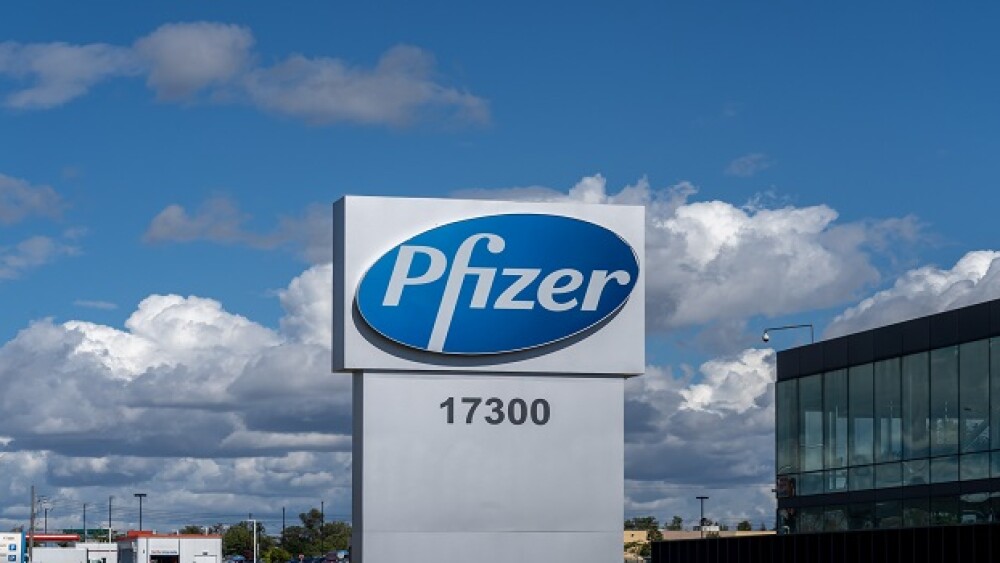Phase III data for Pfizer’s respiratory syncytial virus vaccine candidate showed high levels of protection for older adults and infants.
Pictured: Pfizer sign under a blue sky/courtesy of JHVEPhoto/GettyImages
In two papers published Wednesday in the New England Journal of Medicine, Pfizer touted positive Phase III data for its respiratory syncytial virus (RSV) vaccine candidate, showing high levels of protection for older adults and infants.
The larger of the two studies, dubbed RENOIR, enrolled more than 34,000 older adults aged 60 years and older. Compared with the placebo, Pfizer’s candidate was 66.7% effective in preventing RSV-associated lower respiratory tract illness with at least two symptoms and 85.7% in infections with three or more symptoms. It was 62.1% effective in acute respiratory illness associated with the virus.
These data represent strong progress in the development of RSV vaccines. Still, more work and additional data are needed, Ruth Karron, from the Bloomberg School of Public Health at Johns Hopkins University, wrote in an editorial accompanying Pfizer’s twin papers.
In particular, interim findings from RENOIR are still not enough to determine the effects of Pfizer’s candidate on hospitalization and death or assess its efficacy in subsequent RSV seasons, Karron said.
RSV is a common respiratory viral infection that usually carries mild symptoms. However, the disease is more likely to become severe in young children and older adults. In developing vaccine candidates, biopharma companies have focused on these two vulnerable populations.
Pfizer’s closest competitor in the RSV race is GSK, whose own investigational RSV shot showed an 82.6% overall vaccine efficacy and a 94.1% efficacy against severe disease. GSK is slightly ahead of Pfizer in the regulatory process. The FDA gave GSK’s candidate Priority Review in November 2022, while Pfizer won this designation in December 2022.
Both companies also won the backing of the FDA’s Vaccines and Related Biological Products Advisory Committee in March. Voting 7-4 for Pfizer and 10-2 for GSK, the panel of external experts recommended the approval of both candidates, citing good safety and efficacy data.
The FDA is expected to make a final decision regarding both vaccines in May.
Infant Trial Hits One of Two Endpoints
The second NEJM paper looked at the protective potential of Pfizer’s vaccine candidate in infants.
With nearly 7,400 pregnant women enrolled, the Phase III MATISSE trial met one of its two primary endpoints. At 90 and 180 days after birth, Pfizer’s RSV shot was 81.8% and 69.4% effective in reducing medically attended RSV-associated severe lower respiratory tract illness, respectively.
However, the study fell short of its other primary endpoint of medically attended RSV-associated lower respiratory tract illness.
As for safety, MATISSE reported no concerning signals in mothers and infants up to 24 months of age. Adverse events were balanced between the vaccinated and control groups.
In February 2022, GSK was forced to suspend three maternal clinical trials after a routine safety assessment by an Independent Data Monitoring Committee. The company did not specify what safety concerns were identified.
Tristan Manalac is an independent science writer based in metro Manila, Philippines. He can be reached at tristan@tristanmanalac.com or tristan.manalac@biospace.com






